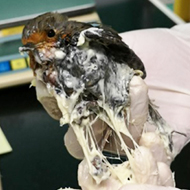
The RSPCA welcomes the news.
The Glue Traps (Offences) Bill has completed its passage through the House of Commons, bringing a ban on the use of glue traps in England a step closer.
Glue traps, consisting of a sheet of plastic, cardboard or wood coated with non-drying adhesive to catch rodents, have long been campaigned against by animal welfare charity the RSPCA owing to the severe suffering they cause.
Between 2016 and 2021, the RSCPA received 263 incident reports about the use of glue traps, with non-target species frequently becoming sometimes fatally harmed by the traps.
Sponsored by Jane Stevenson, Wolverhampton North East MP, the Private Members' Bill now has the backing of the UK Government, and would make using a glue trap to catch a rodent illegal in England, unless under license.
Evie Button, from the RSPCA's wildlife department, commented: "Glue traps are horrible devices, which have no place in modern England. Our officers have repeatedly been left shocked and horrified by the awful injuries inflicted to wildlife, pets and other animals.
"It's fantastic therefore that a ban on deadly glue traps is a step nearer, as this Bill completed its House of Commons journey - and we'd like to thank Jane Stevenson MP for all her efforts in making this happen.
"We now look forward to working with Baroness Fookes and other Members of the House of Lords; as we edge closer to ridding England of glue traps; which are indiscriminate and risk causing animals severe suffering.
"Unfortunately, glue traps are widely available and a cheap method of rodent control - but there are other, more humane methods available too such as humane deterrence.
"We hope any ban on glue traps extends to their sale, as well as their use - and urge British nations to work together to overcome any barriers in law to stopping their sale; and work to get these devices out of shopping baskets and into the history books."
Images (C) RSPCA



 The Veterinary Medicines Directorate (VMD) is inviting applications from veterinary students to attend a one-week extramural studies (EMS) placement in July 2026.
The Veterinary Medicines Directorate (VMD) is inviting applications from veterinary students to attend a one-week extramural studies (EMS) placement in July 2026.